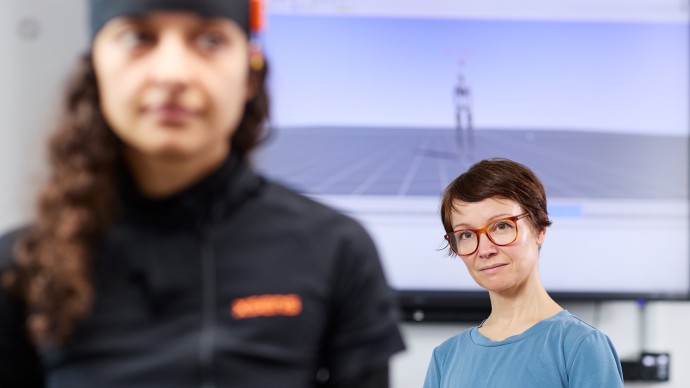Understanding Parkinson’s disease
Understanding Parkinson's disease

About
Parkinson’s is a dreadful disease that affects more than 10 million people worldwide. In our 200th anniversary year, neuroscience researchers at Manchester Metropolitan University are helping to better understand the condition and devise new treatments.
The main story continued
Think of Parkinson’s disease and what springs to mind? Trembling hands? Slow speech?
How about feeling like your feet are glued to the ground, or suddenly freezing when walking through a door? It’s these lesser-known but equally common symptoms our researchers are working to treat.
One in 50 of us will go on to develop Parkinson’s, and while shaking limbs might be what stereotypically define the disease, it’s balance and gait problems that can prove most debilitating of all.
“We know from talking to people with Parkinson’s for many years that the main symptom they find really disabling is their inability to walk around properly and stay balanced,” explains Professor of Neuroscience Nicola Ray whose research is working to solve these problems.
“It’s one of the things that really reduces their quality of life.”
For people with Parkinson’s, movement problems can be devastating.
Progressive problems
Professor Monty Silverdale, Consultant Neurologist at Salford Royal Hospital, works with Prof Ray, linking University research with clinical practice.
He explains just how progressive these problems can get.
“Initially, when people with Parkinson’s start developing symptoms, they might find that their balance is poor,” he said.
“They might have some falls, and they might have what we call freezing, which is where people get stuck when they walk through a doorway, for example. This type of symptom inevitably progresses over time, and eventually, people will become pretty much wheelchair bound, unable to stand and unable to walk.”
With new technology, we have an amazing opportunity to record from the brain, understand what's going wrong and hopefully develop treatments.
It’s a bleak picture, but one Profs Ray and Silverdale – along with Dr Antonella Macerollo at the Walton Centre in Liverpool - are working together to change, despite challenges. While the current treatment for Parkinson’s is effective at controlling tremors and stiffness, at least in the early stages of the disease, those stubborn gait and balance problems are proving frustratingly hard to solve.
“Our medications initially work for these symptoms, but then often will stop working,” says Prof Silverdale.
“It’s important to understand why this happens, why people get these gait problems and what we can do about them. With new technology, we have an amazing opportunity to record from the brain, understand what’s going wrong with gait and balance problems in Parkinson’s, and then hopefully develop treatments that can target that and improve things.”
Improving symptoms
It’s what’s known as ‘deep brain stimulation’ (DBS), a treatment so futuristic sounding it could be part of a sci-fi plot. DBS is the main type of surgery used to treat Parkinson’s, and despite its space-age name, is a tried-and-tested way of improving symptoms like tremors when medication stops working.
It involves a device being placed under the skin around the chest, which is then connected to fine wires inserted into specific areas of the brain. When the system is switched on the electrodes deliver high-frequency stimulation to the target area, changing some of the electrical signals in the brain that cause the symptoms of Parkinson’s.
The problem is: it’s not helping those gait problems.
“We know that the region of the brain we target with DBS is involved in posture and gait, but we don’t know why DBS isn’t quite working to control it,” says Prof Ray.
“So, the work we’re doing is to understand why that is and whether we can use different regions of the brain and different medications to try and help deep brain stimulation work better for posture and gait deficits.”
Life changing advancements
It’s potentially life-changing work, set to benefit not just Parkinson’s patients who visit the University’s high-tech research labs, but those living with the disease around the world.
Profs Ray, Silverdale, Dr Macerollo, and their team are collecting images and recording activity from deep brain electrodes implanted in people with Parkinson’s who’ve undergone DBS. The information they retrieve will help understand how the brain influences symptoms like freezing and difficulty walking.
Meanwhile, cutting-edge University facilities like the MRI imaging scanner and the gait and biomechanics lab at Manchester Metropolitan University Institute of Sport provide insights into how brain circuits affect movement.
And, amazingly, thanks to advances in DBS technology developed by the medical device company Medtronic, it’s now possible to wirelessly record this brain activity with the same technology you’d use to listen to a podcast.
“Medtronic have now made it possible for us to record via Bluetooth,” says Prof Ray. “After the patient goes home and recovers from surgery, we bring them into the lab. They can perform different activities like walking, resting and playing a game, and we can record activity remotely from inside their brain.”
A brighter future
So far, about 20 Parkinson’s patients have been successfully recruited, with the aim of bringing another 40 on board within the four-year project period. “Being able to work with patients who’ve had a huge change in their lives after DBS is hugely rewarding,” adds Prof Ray.
Already, the ripples of impact are being felt. Prof Ray’s on the steering committee for the national charity Parkinson’s UK, hearing first-hand from people with the disease about how gait and posture issues affect their lives, and influencing strategy.
To be able to work on this research, potentially transforming the lives of those living with a disease as devastating as Parkinson’s, is really special.
Then there’s the strong NHS links, due to the project’s collaboration with DBS services run through the Northern Care Alliance and the Walton Centre in Liverpool. Add to that, backing from the Medical Research Council and the Wolfson Foundation, and the future for Parkinson’s-related movement issues looks bright.
“This is all setting the groundwork for bigger scale projects that will hopefully start to lead to treatment changes,” says Prof Ray. “To be able to work on this research, potentially transforming the lives of those living with a disease as devastating as Parkinson’s, is really special.”
Listen to our podcast

MetCast: How we transform health
Hear from our experts about the ground-breaking research that helps us understand more about Parkinson’s disease in our podcast, MetCast.About 200 years
Manchester Met celebrates two centuries of driving progress through excellent education and research.
-
![200 years 1824-2024]()
200 years
Find out more -
![Two nurses standing together and smiling]()
Transforming health
Find out more


